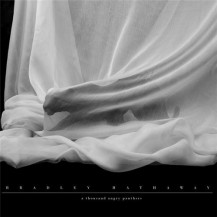Bradley Hathaway’s “A Thousand Angry Panthers”
“But perhaps what impressed me most was his tasteful and complementary instrumentation.” -CEB
C.E. Breslin
8
out of 10
Bradley Hathaway
A Thousand Angry Panthers
June 1, 2010
Perhaps I betray a bit of East Coast bias, or at least a supreme ignorance when it comes to Midwestern geography, when I wonder just how far Goshen, AR is from Omaha, NE?
439 miles.
More than a whimsical daytrip, to be sure. Bradley Hathaway howlingly traverses this space between his own hometown and that epicenter of Midwestern folk discontent (care of Bright Eyes’ Conor Oberst) in the mere span of 4 songs. But it is here, in the space between his adolescent spoken-word ramblings and his burgeoning folk-stylings that Hathaway has made his home. The same disturbance and sincerity that allowed him to pen self-searching poetry about his “manliness” enables him to speak of matters of love, death, Jesus, sickness, war & rescue with more precision than Oberst’s crazed apocalyptic. Though “She Was Raised By A Man With A Sickness” does share Cassadaga’s penchant for duality and drama (and Oberst’s general proclivity for lengthy song titles).
Track two reminds us of the consequence of distance and geography. “Carolina” acts as a circuitous interstitial between heart (KY) and dreams (AR). This middle ground, Hathaway proves, can be a fruitful place to look both back and forward; inching closer to something (or someone) only to leave behind what you’ve known and where you’ve been. It’s no wonder that a spoken-word poet might be firmly in his conceptual and lyrical wheelhouse. Like Oberst, such sustained interiority sometimes yields moments of eye-rolling indulgence (“Would You Think Less of Me”). But for every “My heart breaks into a thousand pieces like glass,” we get several earnest revelations like, “There is love/ There is beauty/ And then there is pain/ And at the moment I can’t help but feel/ They’re all the same.”
But perhaps what impressed me most was his tasteful and complementary instrumentation. He textures earnest contemplations with fittingly delicate electric guitar scales and mandolin (“Carolina”). And on “Would You Think Less of Me,” we are served an appetizing dose of ghostly piano trickle.
Finally, “The World Is Screaming” harkens to a late mewithoutYou ballad. Though squarely within the Weiss/Oberst mold, there’s plenty of room for Hathaway on the theology-infused-folkster horizon. This EP marks a significant milestone in maturity and growth for the young wordsmith. Perhaps the most pivotal part is the restraint he’s shown. Hathaway seems to be getting comfortable with himself, secure with his words and more understated in his delivery. The result is a quartet of songs with enough intensity to hold the Angry Panthers at bay and enough gripping honesty to captivate the listener.
